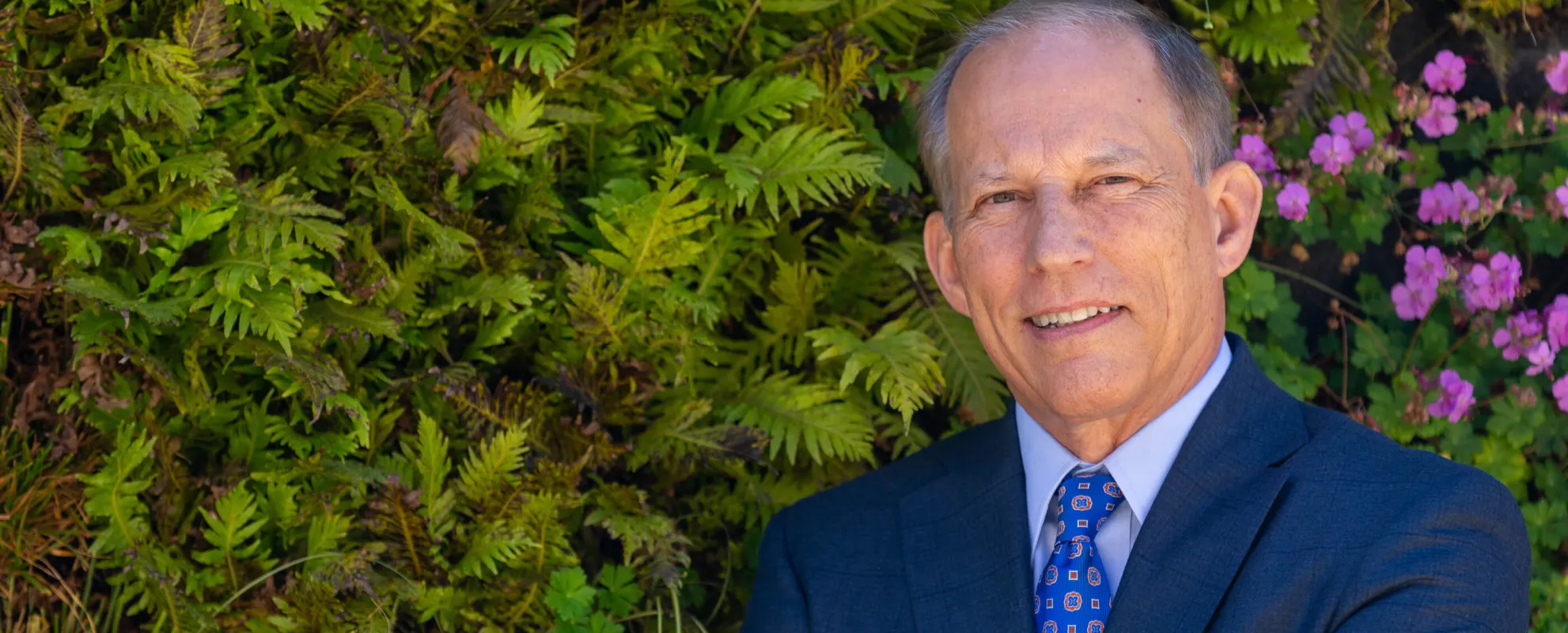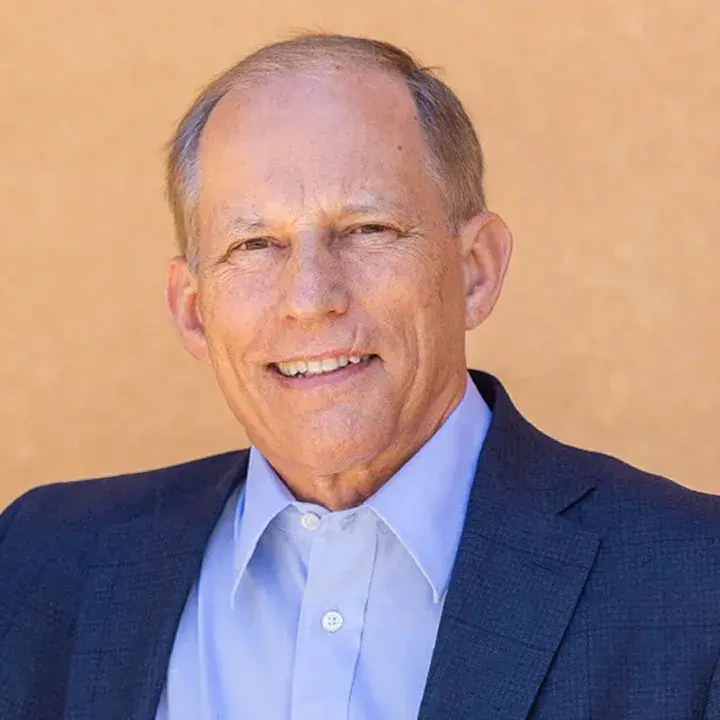David C. Prakash (MSx ’18) tells the story of meeting Hank Scherf (MBA ’81) with more than a little wonder.
Scherf had invited a friend of Prakash’s, a fellow military veteran, to his house in Menlo Park and suggested that his friend bring a guest. That’s how Prakash, a former Air Force pilot and flight surgeon, ended up sipping wine with a future mentor.
“I’m thinking, ‘Who is this guy? Who invites complete strangers over to his house?’’’ Prakash recalls. “But over the next two years, I learned he does that for every Stanford GSB military veteran. By the end of the MSx Program, all the vets in my class had dinner at Hank’s house or personally connected with him at some point.”
Because of that quiet but steadfast generosity, Prakash nominated Scherf for the Jack McDonald Military Service Appreciation Award from the school’s Veterans Club.
Scherf will receive the award at a gala on May 15. In addition to his Stanford MBA, the Certified Financial Planner and financial advisor at MassMutual Pacific earned a master’s in mechanical engineering from North Carolina State University and graduated with distinction from the United States Naval Academy. He served in the Navy as an aviator, retiring at the rank of captain.
Scherf’s selflessness isn’t limited to veterans. An Eagle Scout as a young man, he also serves on the executive board of the Boy Scouts of America’s Pacific Skyline Council and the Western Region BSA board of directors, as well as four other nonprofit boards.
“I’ve spent a lot of time with Hank, and each time, I indirectly hear about another veteran or spouse that Hank has ‘adopted,’” Prakash says. “I’m struck by how much he does, and how little people know about it. Hank’s efforts are subtle, but his impact is profound.”
Hey, you’ve been appreciated!
The award was quite a surprise and quite an honor. When I look at the people who have been presented this award in the past, it’s pretty awesome.
From naval aviator and engineering instructor to the Silicon Valley tech industry to financial services — tell us what those three careers have in common.
You reach different points in life when it’s time to repot yourself into something new. And none of these was part of a big plan for me, other than being a naval aviator. I was content to be a career active duty naval officer. But while I was an instructor at the academy, two of my colleagues left to come to Stanford GSB. They convinced me to apply and I was accepted. Coming out of business school, I was like so many military veterans trying to figure out what I wanted to do, because a military career doesn’t always directly relate to a civilian career. So, I spent five years in marketing before figuring out that I really needed to be in sales. That’s when my career really took off.
So you started a series of sales jobs with a number of startup companies, but what about the shift into financial services?
In 2002 we sold a startup to a competitor right at the tail end of the tech boom crash. But when I contemplated going back into another tech startup, I felt burned out. That was an inflection point where I repotted myself again. I asked myself what was important to me, and decided, 1) I wanted to be in a business where I could be helping people, and 2) I wanted to be in charge of what I do, not be at the mercy of a CEO or venture capital investor or market forces. So I went into financial services and became a financial advisor. But there is an ongoing theme, because I was in service to either country or people.
What role did the lessons of scouting play in your professional life?
Scouting taught me leadership skills, about setting goals and achieving them, and gave me a moral and ethical compass. That’s why I’ve stayed involved with the organization, because I know what it does for individuals. My success at the Naval Academy is directly attributable to what I learned in terms of leadership, goal setting, and life skills. That’s never left me.
What leadership qualities do you look for in others?
Number one is integrity. They have to be honest and upfront. They need to be able to back up what they say with their actions, and they have to be willing to get out in front and lead and take charge. But you also have to listen to those that you’re leading.
Are the leadership challenges the same in the military, the corporate world, and the nonprofit world?
In the military, you always had the military justice hammer to get people to do things you need them to do. Of course, that’s not the ideal way to lead. You still have to motivate them. But in a for-profit organization, you can’t just tell someone what to do, you have to inspire people to get them to do what needs to be done for the good of the team and the organization. After 10 years of active duty in the military, I had to shift leadership methodology to the civilian world, and that was a big adjustment. When you get into the nonprofit world, where you’re working with volunteers, you can’t tell anybody what to do. They can just walk out the door. So it’s about getting everyone to share your vision.
Any unforgivable sins when it comes to leadership?
Lying to someone or deceiving them is an unforgivable sin. When you’re in the military and in a tight situation, flying or whatever, you have to trust the people you’re working with. Your life may depend on them being honest.
You’ve chaired the San Mateo County Veterans Commission since 2017, and often mentor members of the Stanford GSB Veterans Club as they transition from military to civilian life. What’s the most challenging part of that role?
Trying to not tell an individual what I think they ought to do. It’s more about listening and then helping them think through stuff. They have to make their own decisions. I just relate to them my experiences and give them things to think about. When I was a junior officer, I never had a mentor. I’m not certain I was capable of having a mentor because I came from the old school where that showed weakness. But I’ve come around on that. I made a lot of mistakes and learned a lot of things, and if I can help some young person short-circuit some of those mistakes and move forward more smoothly, then I’ve given them something.
In that role, you’ve stressed the need to dig into the veterans benefit system to discover any obstacles that may prevent vets from getting a “square deal.” What do you feel are the system’s most pernicious problems?
To be honest, it’s bureaucracy. I went through this myself. When I went to Stanford GSB, I was entitled to G.I. Bill benefits. But the Veterans Administration gave me the runaround for six months until they finally started paying me. When I was able to start receiving Navy retirement benefits, I had the paperwork in three months ahead of time, but it took six months before they started giving me my money. That’s not a way to treat veterans. So, we try to find the vets who have needs and help them get through the bureaucracy to get what they’re entitled to.
You’re also working on ways to publicly recognize local vets. Why is that important?
We have an annual veterans recognition luncheon where we bring in a lot of veterans, and we get corporations to sponsor tables so they can send their employees who are vets or we use the extra seats to invite veterans from local VA hospitals. We also invite local politicians and community leaders including police chiefs, fire chiefs, and the county sheriff — bringing the civilian community together with the veterans community. It raises awareness and support. Now I’m on a first name basis with all these individuals and I can go right to them when I have a vets issue to discuss.
Does your board membership with the Redwood City Child Development Program indicate a gap in the social safety net for those kids?
There definitely is a gap. It’s so expensive in this area for families to exist, so you end up having both parents employed. So what do they do with their children while they’re working? The organization was formed to provide early education and child development services. It’s not just a babysitting service. Many come from a Hispanic area, and we teach them to speak English. It’s an education program, and it’s a godsend for them so that both parents can work.
Any particular books, professors, or lessons you took away from Stanford that you’ve found particularly valuable?
The friendship and networking with my classmates has helped me in a lot of business and personal situations. I guess that’s the big thing I got out of it. And Jack McDonald, for whom this award is now named, had an impact even though I never took his class. In the spring before I was to enter Stanford, I sat in on one of his classes. He spent five minutes talking about how the class would be run, then he called on students to stand up and present the case. Boom, you were supposed to have read all this stuff before the class even began! And I thought, “What am I in for?” I knew I’d have to be prepared.
Any advice for incoming Stanford GSB students?
Get to know your classmates well — spend time with them, party with them — because that network will be really important in your life. I didn’t have a lot of time to spend doing that with my classmates, because I was in the Navy Reserve and two weekends a month I went across the Bay to fly an A-7 jet. Also, I was pretty narrowly focused on staying in Silicon Valley and working in tech. I didn’t interview with a wide enough variety of employers. I encourage them to talk to recruiters about all kinds of different jobs as they sort through what they might like to do, because you learn something new in every interview.
Photos by Kiefer Hickman


